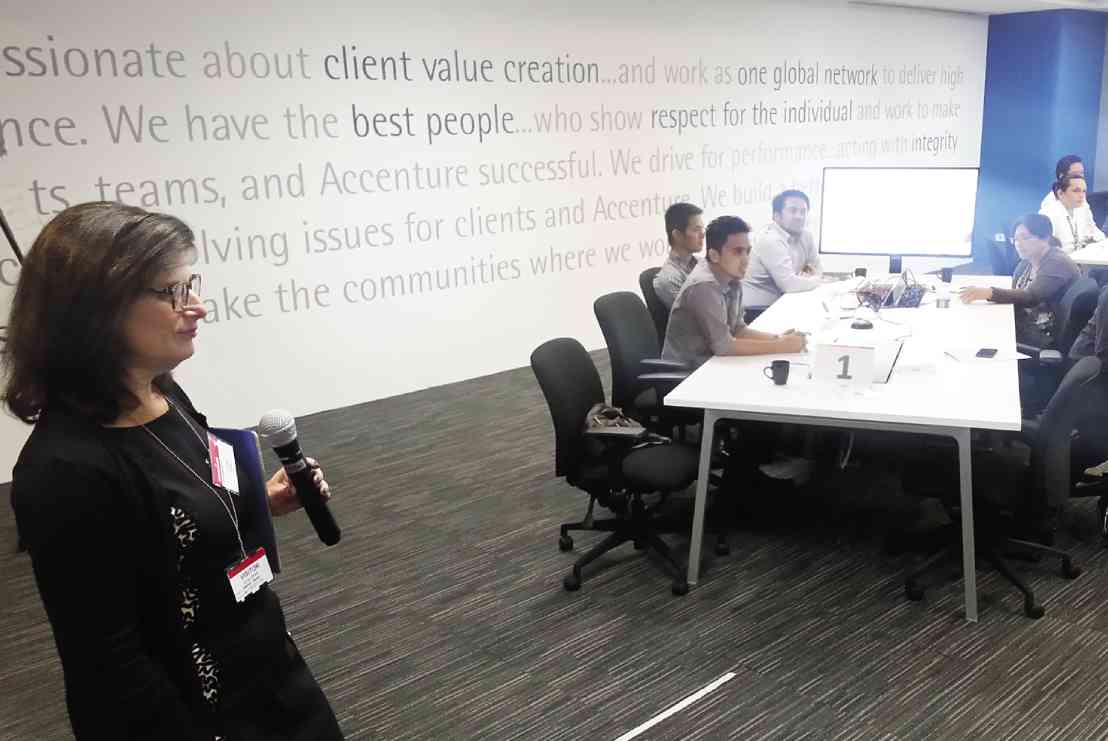
ELLYN Shook, chief human resources officer, observes employees in Cebu via Telepresence as they undergo supervisory skills training under the Accenture Connected Learning program.
Global company Accenture believes that, to remain ahead of the game, it has to take good care of its workforce.
That may be easier said than done considering that Accenture—a global management consulting, technology services and outsourcing company—has approximately 319,000 employees worldwide.
In the Philippines, it employs over 35,000 people, making it the second largest in Accenture’s global delivery network.
“We are very passionate about our people. We are committed to help them grow,” says Ellyn J. Shook, Accenture’s chief human resources officer.
She admits that it is not an easy feat, especially if you have plenty of people who depend on you for their livelihood.
Shook says that the Philippines is a very important country because of its scale and quality of talent here.
The country is home to a young population with a median age of 23 years old. This is seen as an advantage on most fronts. The high population growth rate here is considered an economic driver.
In addition to the expected rise of the working age population, Shook points out that there is a lot of talent here.
“Our Filipino employees serve our clients globally,” she adds.
Jesper Madsen of the company’s local human resources unit is “very proud” of Accenture’s growth story in the Philippines.
For 30 years, he says, Accenture has accumulated a good number of success stories.
“I expect the growth story here in the Philippines to continue … this year,” Madsen says.
For fiscal year 2015, Madsen expects to recruit 10,000 employees for its workforce.
To continue providing quality service to their clients here and abroad, Accenture invested more than $786 million in employee training and professional development through Accenture Connected Learning.
“Here in Accenture, learning and development is critical and essential. This is why we invest in our people,” Shook says.
The Accenture Connected Learning, launched last September, aims to “democratize” learning by providing “millennials”—who comprise approximately two-thirds of Accenture’s workforce—with equal opportunities.
Accenture’s program makes learning more flexible and increasingly democratized. All Accenture employees are provided basic skills and even industry-specific content.
Shook explains that the company is exploring new forms of learning to further help employees. She considers technology to be essential in the learning process.
“We have over 213 millennials here. So we apply a very consumerized approach, like digital learning boards,” she explains.
Accenture has more than 300 learning boards, where content such as technology, industry, trends and leadership is available.
It has more than 50,000 followers in Accenture and more than 175,000 hits to its site.
Next month, the Accenture career marketplace tool will be available to Filipino employees.
This is where employees may view new opportunities available within the company. Through the marketplace, employees can see every open opportunity. In addition, it details the needed skills and capabilities that is required of the workers.
“Millennials are looking for different experiences. Instead of them searching for that experience elsewhere, we’d like to capture them. We want them to be super happy here,” Shook says.
Aside from opening more growth paths, Accenture aims to decrease the attrition rate.
Another modern approach to learning is through connected classrooms.
A training classroom in Manila is connected to Cebu using state-of-the-art technology.
A video camera is installed in the Manila and Cebu classrooms. Learners can see each other via live streaming. Microphones are installed in both locations. A Cebu-based employee can join the conversation in Manila.
Accenture has 22 connected classrooms across the globe. The outsourcing company plans to grow more than 150 connected classrooms in 18 months.
“We want them to learn without leaving the country,” Shook says.
Accenture first came to local shores in 1985.
“We look forward to higher investments in 2015. Also, to establish a different and unique collaboration between the Philippines and the world,” Shook says.